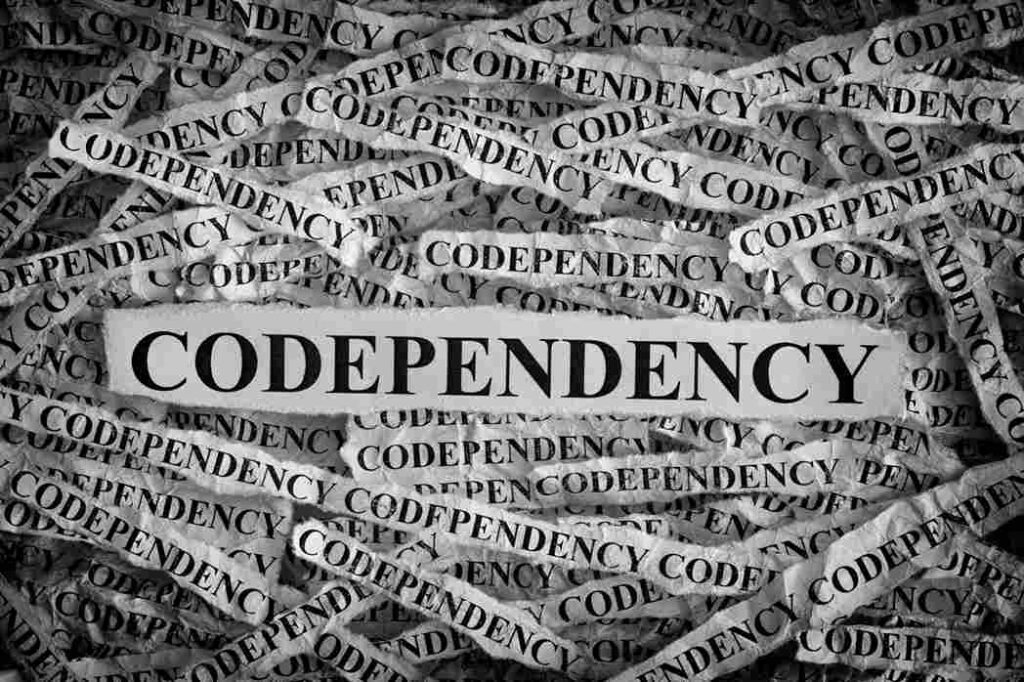Codependency, a complex emotional and behavioral condition, can impede an individual’s ability to maintain healthy, mutually satisfying relationships. It can stem from various sources and manifest in countless ways. But what happens when the line between caring and self-sacrifice blurs too much? When does the dedication shift from being a nurturing bond to a draining, one-sided commitment? This blog post aims to unravel these complexities, exploring the therapy for codependency, and most importantly, benefits that can foster healthier relationships.
Contents
Can Therapy Help With Codependency?
 Yes, therapy can certainly be beneficial in addressing and overcoming codependency. By providing a safe, non-judgmental space, therapy allows individuals to uncover the root causes of their codependency, often tied to childhood experiences or previous unhealthy relationships. Therapists can guide individuals through the process of understanding and challenging their patterns of thought and behavior.
Yes, therapy can certainly be beneficial in addressing and overcoming codependency. By providing a safe, non-judgmental space, therapy allows individuals to uncover the root causes of their codependency, often tied to childhood experiences or previous unhealthy relationships. Therapists can guide individuals through the process of understanding and challenging their patterns of thought and behavior.
This can include identifying and reframing negative self-beliefs, developing effective communication and assertiveness skills. And learning to establish healthier boundaries. Moreover, therapy can help individuals cultivate better self-care habits and foster a stronger sense of self-identity. Overall, while the journey to overcome codependency may be challenging, therapy provides valuable tools and strategies.
What Are Some Best Therapy For Codependency?
Codependency is a complex issue that can benefit from a variety of therapeutic approaches. Here are a few that have been proven effective:
Cognitive-Behavioral Therapy (CBT)
CBT is based on the idea that our thoughts, feelings, and behaviors are interconnected. It aims to challenge and alter negative thought patterns, thereby influencing feelings and behaviors. For instance, someone with codependency might believe they’re only valuable when they’re needed, leading to over-nurturing behavior. A CBT therapist would help this person identify such beliefs, understand their impact, and develop healthier thought patterns and coping mechanisms.
Dialectical Behavior Therapy (DBT)
DBT was initially developed to treat borderline personality disorder, but its efficacy has been found in a range of issues, including codependency. It combines standard cognitive-behavioral techniques with mindfulness practices. The therapy works on enhancing patients’ capabilities (like mindfulness, emotional regulation), improving their motivation to change. It will ensure that new changes are incorporated in their daily lives, and enhancing therapist’s capability and motivation.
Eye Movement Desensitization and Reprocessing (EMDR)
EMDR is typically used to help individuals process and overcome traumatic experiences. Given that many people develop codependent behaviors as a result of childhood trauma or dysfunctional family dynamics, EMDR can be beneficial. It involves recalling distressing images or memories while receiving side-to-side eye movements, hand tapping, or auditory tones. Ultimately, leading to the reprocessing of traumatic memories.
Mindfulness-Based Therapies
These approaches emphasize present-focused, non-judgmental awareness of one’s thoughts, emotions, and sensations. By learning to observe their experiences without reacting, individuals with codependency can develop greater self-awareness and break the cycle of seeking validation from others. Mindfulness can also help manage stress and improve emotional regulation, which are often challenging for those with codependency.
Family Systems Therapy
 Family systems therapy operates on the idea that an individual’s behavior is best understood in the context of their family system. This therapy can be especially relevant for codependency, which often arises within families and affects the entire family dynamic. A family systems therapist might work with the whole family to uncover patterns of dysfunction, improve communication, and promote healthier interdependencies.
Family systems therapy operates on the idea that an individual’s behavior is best understood in the context of their family system. This therapy can be especially relevant for codependency, which often arises within families and affects the entire family dynamic. A family systems therapist might work with the whole family to uncover patterns of dysfunction, improve communication, and promote healthier interdependencies.
Group Therapy or 12-Step Programs
Group settings, like Codependents Anonymous (CoDA), can offer a sense of camaraderie and mutual understanding that can be incredibly therapeutic. These spaces allow individuals to share their experiences, challenges, and successes in a supportive, non-judgmental environment. Additionally, the 12-step structure provides a tangible roadmap for recovery, promoting self-awareness, acceptance, and personal growth.
It’s important to remember that not every therapy type will work for every person. Each individual’s experiences, symptoms, and personal circumstances should dictate the type of therapy used. If you’re seeking help for codependency, a licensed mental health professional can guide you to the therapy. That may be most effective for you.
How Does Therapy For Codependency Work?
Therapy for codependency involves a number of components. And it’s typically tailored to the individual’s specific circumstances. However, here’s a general idea of what you can expect.
Assessment
Initially, the therapist will conduct a thorough assessment to understand the individual’s relationships, family background, and personal experiences. This could involve discussing their family of origin, their relationship history, and their present-day relationships and experiences. By gathering this information, the therapist can help the individual recognize patterns of codependent behavior and the possible root causes.
Understanding and Recognizing Codependency
A crucial part of therapy involves educating the individual about what codependency is and how it impacts relationships and personal wellbeing. By identifying the characteristics of codependency and how it manifests in the individual’s life, the person can start to recognize their own patterns of codependent behavior. This understanding is a critical first step towards change.
Changing Unhealthy Thought Patterns
As with many psychological issues, codependency often involves unhelpful thought patterns that drive maladaptive behaviors. Cognitive-Behavioral Therapy (CBT), in particular, focuses on identifying these thoughts. And working to challenge and change them. This might involve reframing negative self-beliefs, or learning to recognize cognitive distortions like “mind-reading” or “catastrophizing.”
Developing New Skills
Therapy for codependency will also involve learning and practicing new skills, such as setting boundaries, improving communication, and practicing self-care. These skills can help individuals navigate relationships in healthier ways and reduce their reliance on others for self-worth and validation.
Mindfulness and Self-Compassion
Mindfulness practices can help individuals with codependency learn to tune into their own needs and feelings, rather than focusing excessively on the needs of others. Likewise, exercises in self-compassion can help individuals learn to value themselves and reduce feelings of shame and inadequacy.
Ongoing Support and Maintenance
Overcoming codependency is often a long-term process. And it’s not uncommon for individuals to require ongoing support. This might involve continued individual therapy, or participation in support groups. Regular check-ins with a therapist can help individuals stay on track. And continue to develop healthier ways of relating to others.
In all, while the journey may be challenging, with the right tools and professional guidance, it’s entirely possible to break free from codependency and build healthier, more satisfying relationships.
How To Choose The Best Therapy For Codependency?
 Choosing the best therapy for codependency involves taking several factors into account. Here are some steps to help guide you in making this decision:
Choosing the best therapy for codependency involves taking several factors into account. Here are some steps to help guide you in making this decision:
- Understand Your Needs
Everyone’s experience with codependency is unique. Some might struggle with setting boundaries, while others might have difficulties managing their emotions or dealing with past trauma. Understanding your own specific needs and challenges can help you identify the type of therapy that might be most beneficial for you.
- Consider the Therapeutic Approach
As mentioned previously, there are several different therapeutic approaches to treating codependency. Research and understand each approach to determine which one aligns best with your needs.
- Find a Qualified Therapist
It’s important to work with a licensed mental health professional who has experience treating codependency. You can ask potential therapists about their qualifications, experience, and approach to treating codependency during an initial consultation.
- Comfort Level with Therapist
The relationship you have with your therapist plays a crucial role in the success of therapy. You should feel comfortable with your therapist and feel that they understand and respect you. If you don’t feel comfortable or safe with a particular therapist, it’s perfectly okay to look for another.
- Don’t Be Afraid to Reevaluate
If you feel that the therapy or therapist you initially chose isn’t working for you, don’t be afraid to reassess. It’s common to switch therapists or therapeutic approaches if the current one isn’t meeting your needs.
Remember, recovery from codependency is a journey. And finding the right therapeutic approach and therapist might take time. It’s important to be patient with yourself throughout this process and celebrate the progress you make along the way.
Conclusion
In conclusion, codependency is a complex emotional and behavioral condition that can negatively impact an individual’s ability to maintain healthy, mutually satisfying relationships. However, it’s important to remember that codependency is not a life sentence. With the right therapy for codependency and professional guidance, individuals can overcome the patterns, developing healthier ways of relating to themselves and others.
The process may be challenging and time-consuming. But the results—improved self-esteem, healthier relationships, and a greater sense of autonomy—are certainly worth the effort. Relationships are complex, and it’s natural for issues to arise along the way. If you have any queries regarding Relationship Counseling experienced therapists at CoupleMantra can help: Book a trial couple therapy session


